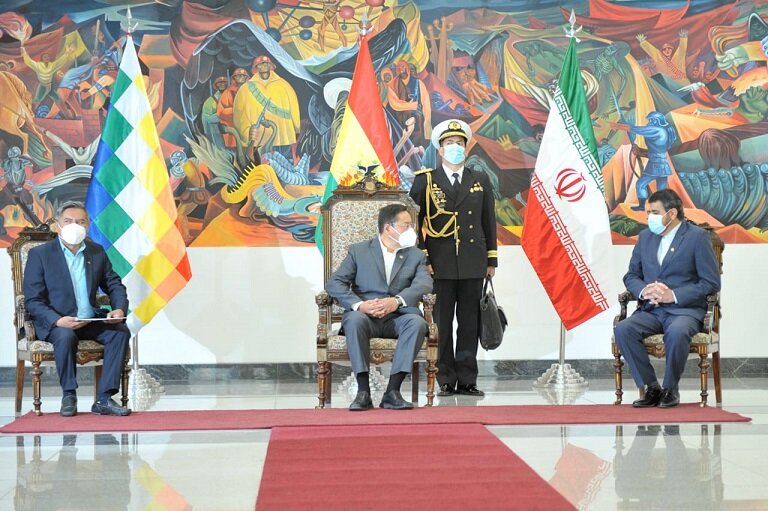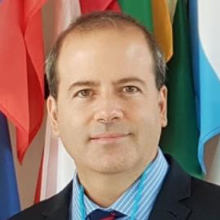Over the last three decades, the use of Serious and Organised Crime (SOC) groups in Latin America as foreign actor’s proxies, for financial, operational and para-diplomatic reasons, has become increasingly evident. While criminal convergence among SOC groups has been widely studied, the growing convergence between SOC groups and both foreign state and non-state actors has been mostly ignored, despite representing an increasing national security threat.
The Three pillars of a Symbiotic Relationship
In many cases, states have built alliances with SOC groups for economic reasons. For years the “Soles” cartel, formed by high-ranking Venezuelan military officers, has been accused of establishing alliances and using the FARC and other SOC groups as cocaine suppliers. The fact that local SOC groups are legitimised by local elites and considered part of the domestic ruling political structure serves to facilitate their role as a provider of services for foreign actors. For example, Iran has been found to be trafficking illicit gold from Venezuela to other Middle Eastern countries. Additionally, other states profit from SOC groups’ criminal activities. The Chinese IUU fleet operating on the limit of the Ecuadorean and Argentina EEZ has received substantial support from the Chinese government through subsidies and has been repeatedly linked to SOC groups. Since the war in Ukraine, Russia has sought to exploit SOC groups abroad as a source of income for covert operations.
The second pillar of SOC-groups-as-proxies is linked to operational benefits. In 1992 and 1994, Argentina suffered two terrorist attacks. Both attacks were the result of Hezbollah cells, with support from Iran, operating from the Tri-Border area (TBA) between Argentina, Paraguay, and Brazil. in exchange for money, local crime groups were enlisted to handle the required logistics. This same pattern can be seen today. Hezbollah is still operational in the area, with some of the suspects still residing in the TBA. Similarly, in 2016 almost 400 kilos of cocaine were found hidden in the Russian embassy annex in Buenos Aires. Whilst no links were found with the Russian government, former Russian diplomatic officials sat trial in a non-public trial, and a local police officer with links to Russia, is currently jailed in Argentina.
Finally, the other reason why foreign actors seek to use local SOC groups as proxies is due to para-diplomatic reasons. For many years Cuba has had strong and solid links with the FARC. For Cuba, this narco-insurgent group provided the best opportunities for the revolution to expand in Latin America, therefore providing substantial support to it. Another country that has provided foreign actors with a para-diplomacy platform is Bolivia, which has been repeatedly identified by the United States Government as failing to do enough to tackle the production and trafficking of cocaine. Since the mid-2000s, Bolivia has provided Iran a strong foothold in Latin America, including the possibility of developing a counternarrative favouring Iranian interests. In 2012, Bolivia signed a rather unique agreement with Iran involving training to counternarcotic units, and former Iranian president Mahmoud Ahmadinejad visited the country at least three times.
More recently, in July 2023, Iran signed a controversial memorandum of understanding with the government of Bolivia, currently ruled by Luis Arce, who was elected with the support of Evo Morales, who publicly recognised during his tenure that drug cartels permeated all governmental levels and, who in 2008, expelled the DEA from Bolivia. Likewise, in Nicaragua, the criminally-penetrated government of Ortega is used to conduct American counter-narrative supporting Russian interests.
Strengthening Responses to SOC – State Threats
Evidently, there is an increasing interlink between states that have been deeply penetrated by organised crime, SOC groups and foreign state and non-state actors who exploit this situation to pursue their own strategic interests. In some cases, these interactions have involved terrorist groups, but in other cases the state-crime interplay involves relevant global powers such as China and Russia. For example, a recent The Informer article highlighted how the Knights Templar, a renowned Mexican SOC group has acted as a supplier of Iron Ore to Chinese companies that are significantly controlled by the PRC. Similarly, in a recent RUSI study for the EU’s Global Illicit Flows Programme, China is a significant destination for timber illicitly extracted from Ecuador and Peru.
As these interlinks fall in a grey area where they cannot be considered neither a pure domestic security issue nor a defence problem. Consequently, the countries that fall victim to these operations find it problematic to address them appropriately and most lack a comprehensive strategy against it. In many cases, foreign influence through SOC groups in local politics is the first step to achieving strategic advantage, as proved by the recent actions of Russia over Ukraine and the Gerasimov doctrine, where politics are turned into the continuation of war.
A strategy to contain this growing trend should, therefore, provide states with the capabilities to develop flexible and adaptable responses to this hybrid threat. In the first place, it should include the use and exchange of intelligence to identify the final beneficial owner, otherwise known as ultimate beneficial ownership, of these illicit operations to identify involvement of a foreign actor swiftly and decisively. Intelligence agencies, anti-money laundering and financial intelligence units should spearhead this effort, whilst investigative capabilities of local law enforcement agencies should be improved.
In addition to investigative and enforcement powers, local legislation should be augmented to provide legal provisions to tackle these hybrid actors, as most legislation in the region is ill-written to address these new grey-area threats. For example, even though Hezbollah members have transited Brazil for years, the terrorist organisation is still not classified as terrorist organization according to local laws. In Argentina, the national security framework impedes the military from getting involved in law enforcement support operations.
States that suffer from foreign influence through the use of SOC groups, should also develop an attribution strategy, especially when those operations affect national interests. Cases where state-sponsored SOC groups represent a threat to the rule of law and democratic principles should be publicly exposed in international forums such as UNODC.
Finally, and perhaps most critically, states should draft national security strategies that compressively address the full security-defence threats spectrum – inclusive of this grey-area SOC threat. Countries like Argentina not only lack of a national security strategy but a National Security Council and even a national security advisor. This negatively impacts the state’s capability to first identify and subsequently address national security threats that operate on the fringes of the traditional security-defence spectrum.
Martin Verrier is currently a SNKE for RUSI Europe projects and a visiting senior research fellow at King’s College London. He served as Argentina’s Drug Enforcement Deputy Secretary of State from 2015 to 2019. He holds a M.A. in Strategy and Geopolitics from the Argentine Army War College and an M.A in Intelligence and International Security from King’s College London.
Main image Credit: Defence Focus via Twitter.
The views expressed in this article are those of the author and do not necessarily reflect the views of RUSI, ECPR, Focused Conservation or any other institution.



